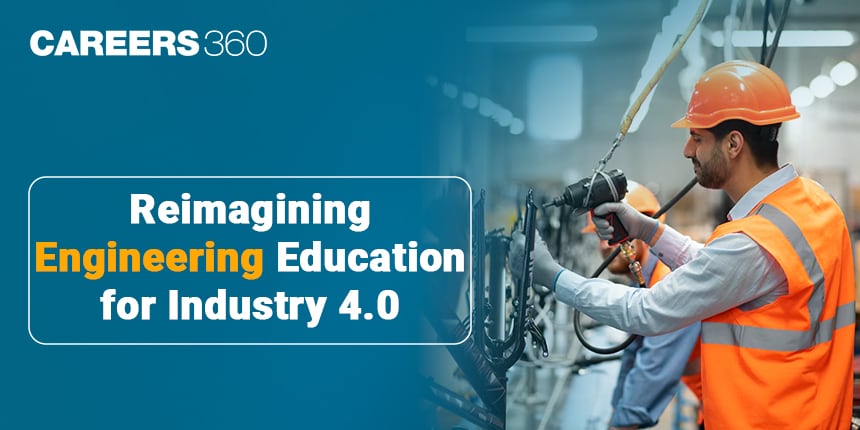MIT World Peace University B.Tech Admissions 2026
Highest CTC 44.14 LPA | UGC Approved | 1600+ Recruiters | 100% Placement
The demand for qualified engineers in India has been growing steadily, with the tech industry alone contributing $250 billion towards the economy and 5.4 million employees in the sector. There will be a requirement for another 900,000 to 1 million engineers over this decade to ensure India keeps up with the increasingly technical world we live in. In a Team Lease report, it was recorded that rapid digitalisation had increased the demand for professionals who know AI, machine learning, and quantum computing. This indicates that engineers will be required to have a T-shaped skill set, including depth of knowledge within their specialities as well as breadth across disciplines, stated by Girija Kolagada, VP of Engineering at Progress.

As companies are witnessing rapid changes associated with Industry 4.0 and jobs in AI, the Internet of Things (IoT), and data science, the engineering education system must change to educate students to live in a world of technology such as AI, IoT, and data science. Developments in India have made it urgent to sort out the contradiction between the skills the modern industry requires, and what is being delivered by the higher education institutions. Engineering programs should help develop the new generation of professionals to meet the same technological challenges by offering relevant content and importantly, hands-on, interdisciplinary, project-based activities in an industry context.
Integrating Emerging Technologies into Core Curricula
The information technology (IT) sector in India is expected to surpass $350 billion by 2030, and much of this growth will have direct ties to the establishment of Global Capability Centres (GCCs), data centres, and focused Engineering R&D (ER&D/T). The rapid evolution of technology has catalysed demand for advanced tech skills and emerging technologies in areas like artificial intelligence (AI), the Internet of Things (IoT), machine learning, and edge computing (EDC). The growing requirement for engineers needed to staff GCCs demonstrates the major growth in the workforce demand for people with Engineering R&D experience, as 65% of engineers hired into GCCs will be designated specifically for ER&D.
In terms of student preparation for the challenges involved in engineering under Industry 4.0, universities and colleges must position these technologies as curriculum foundational requirements. Engineering students must demonstrate proficiencies in:
AI: Students learn to build intelligent and adaptive machines which requires machine learning accuracy, AI ethics, and natural language processing for them to be confident in building intelligent adaptive systems.
IoT: Undergraduates learn the architecture providing insight into sensor technologies as well as efficient connected solution development, requiring competence around sensors and real-time data.
Data Science: Students develop proficiency in big data analytics, statistical foundations for machine learning models, and visualization as multiple new and emerging methods to have exponential data which engineers need to interpret for machines responding within good reliability.
If institutions include these as core courses alongside traditional engineering disciplines, we may expect another generation of engineering graduates to develop our ability to innovate within our expansions across many sectors.
Promoting Practical, Interdisciplinary, and Dynamic Learning
Considering the context of Industry 4.0, engineering education must do more than rely upon theoretical contexts; it should transition to a hands-on interdisciplinary approach. Students should have the opportunity to experience real-world problem-solving in the context of internships, lab work, and industry-oriented projects, where they can use their knowledge in practice. Collaborative activities that bring together artificial intelligence, the Internet of Things (IoT) and data science technologies with health care, business, and other areas to support innovation, can further complement their educational experience as well as further broaden the spectrum of knowledge learning. Moreover, students can upskill by registering for certification programs as they validate expertise in in-demand topics that provide an advantage for students in entering the workforce.
To maintain relevance in the rapidly changing technical landscape, engineering education and curriculum must be agile and reviewed and updated, regularly. Innovation topics in cybersecurity, and cloud computing, which can be easily integrated into the learning process, would create a much larger and holistic understanding of how those technologies are interfacing with various industries.
Strengthening Industry Partnerships and Faculty Development
A robust partnership between academia and industry is critical to developing a curriculum that is ready for the future. However, since the skilled engineering workforce is not as quickly developing, obtaining the right talent for the curriculum is increasingly difficult.
Partnering with industry leaders gives faculty the confidence that is relevant to the marketplace, as well as offering students mentorship, work placement, and opportunities to work on solving real-world problems.
Additionally, if faculty participate in industry workshops and are exposed to new and emerging technologies, the professor can teach students about recent developments, utilizing a practical, hands-on curriculum that students often appreciate. Collaboration with faculty and industry experts allows students to gain information about both the educational aspect of their field and practical and market-focused expectations; ultimately, preparing them for leadership in a changing and developing world of technology.
By focusing on three core areas—context of emerging technologies, practical and interdisciplinary learning, and partnerships with industry— different institutions of engineering in India can provide leadership in developing student professionals ready to work in the 4th generation of industry.
Among top 100 Universities Globally in the Times Higher Education (THE) Interdisciplinary Science Rankings 2026
Recognized as Institute of Eminence by Govt. of India | NAAC ‘A++’ Grade | Upto 75% Scholarships
Among top 100 Universities Globally in the Times Higher Education (THE) Interdisciplinary Science Rankings 2026
70th University Ranked by NIRF | 80th Engineering Rank by NIRF | Accredited by NBA and NAAC A+
Last Date to Apply: 26th March | Ranked #43 among Engineering colleges in India by NIRF | Highest Package 1.3 CR , 100% Placements
Apply for UG & PG programs from Victoria University, Delhi NCR Campus